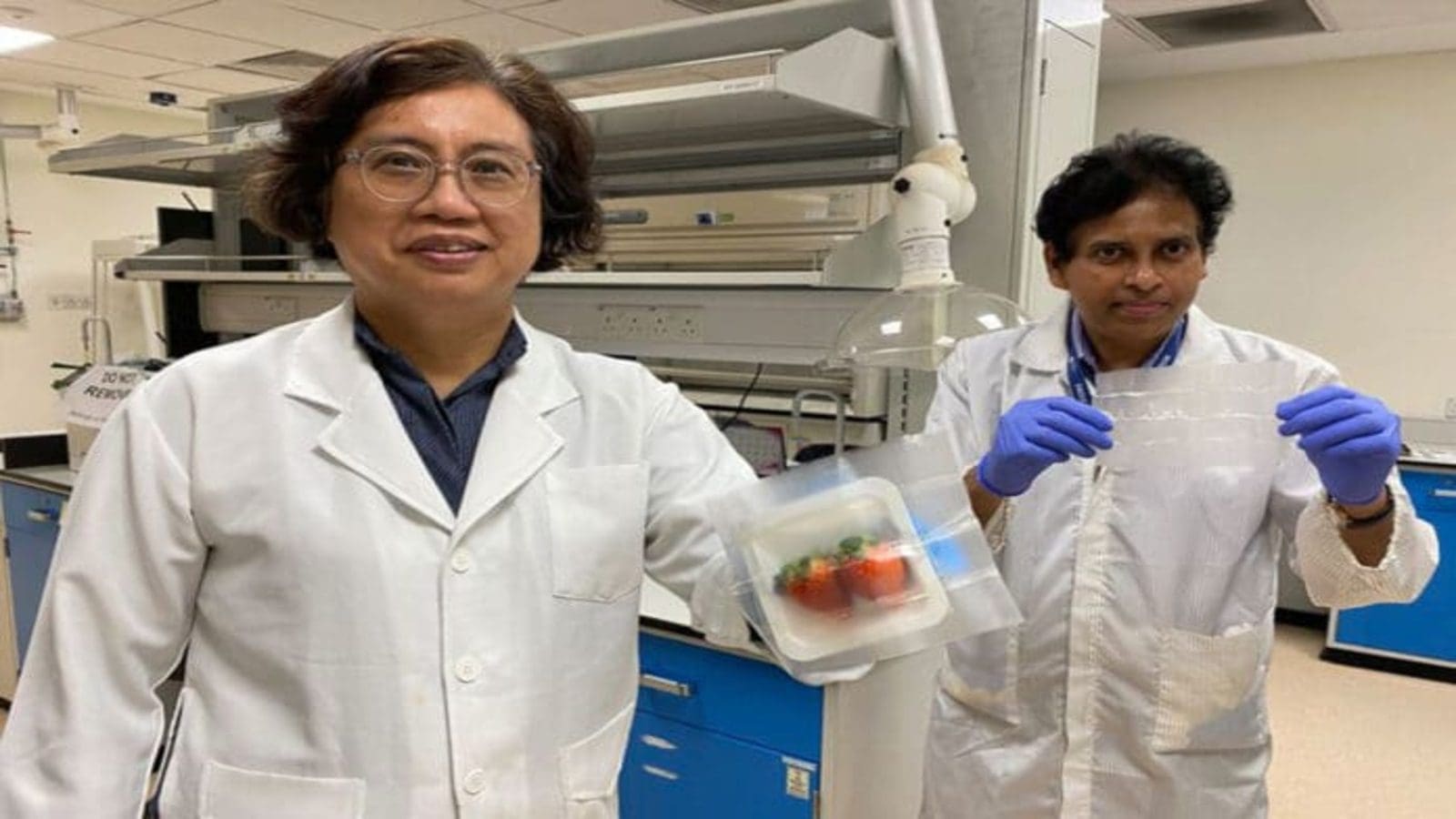SINGAPORE/U.S – Scientists have developed a ‘smart’ food packaging material that is biodegradable, sustainable and kills microbes that are harmful to humans thus extending the shelf-life of products by two to three days.
The invention is the result of the collaboration by scientists from the NTU-Harvard T. H. Chan School of Public Health Initiative for Sustainable Nanotechnology (NTU-Harvard SusNano), which brings together NTU, Singapore and Harvard Chan School , U.S, researchers to work on cutting edge applications in agriculture and food, with an emphasis on developing non-toxic and environmentally safe nanomaterials.
The water-proof food packaging is made from a type of corn protein called zein, starch and other naturally derived biopolymers, infused with a cocktail of natural antimicrobial compounds. These include oil from thyme, a common herb used in cooking, and citric acid, which is commonly found in citrus fruits.
In lab experiments, when exposed to an increase in humidity or enzymes from harmful bacteria, the fibres in the packaging have been shown to release the natural antimicrobial compounds, killing common dangerous bacteria that contaminate food, such as E. Coli and Listeria, as well as fungi.
The packaging is designed to release the necessary miniscule amounts of antimicrobial compounds only in response to the presence of additional humidity or bacteria. This ensures that the packaging can endure several exposures, and last for months.
As the compounds combat any bacteria that grow on the surface of the packaging as well as on the food product itself, it has the potential to be used for a large variety of products, including ready-to-eat foods, raw meat, fruits, and vegetables.
In an experiment, strawberries that were wrapped in the packaging stayed fresh for seven days before developing mould, compared to counterparts that were kept in mainstream fruit plastic boxes, which only stayed fresh for four days.
“The packaging can be applied to various produces such as fish, meat, vegetables, and fruits. The smart release of antimicrobials only when bacteria or high humidity is present, provides protection only when needed thus minimizing the use of chemicals and preserving the natural composition of foods packaged,” Mary Chan, Study Co-Lead, Professor and Director, Center of Antimicrobial Bioengineering, Nanyang Technological University.
The development of this advanced food packaging material is part of the University’s efforts to promote sustainable food tech solutions, that is aligned with the NTU 2025 strategic plan, which aims to develop sustainable solutions to address some of humanity’s pressing grand challenges.
This invention would serve as a better option for packaging in the food industry, as it has demonstrated superior antimicrobial qualities in combatting a myriad of food-related bacteria and fungi that could be harmful to humans.
Professor Philip Demokritou, Adjunct Professor of Environmental Health at Harvard Chan School who co-led the study noted that food safety and waste have become a major societal challenge with immense public health and economic impact which compromises food security.
Innovation to promote sustainable agri-food systems
The Professor who is also the Director of Nanotechnology and Nanotoxicology Center and Co-director of NTU-Harvard Initiative on Sustainable Nanotechnology, pointed out that one of the most efficient ways to enhance food safety and reduce spoilage and waste is to develop efficient biodegradable non-toxic food packaging materials.
“In this study, we used nature-derived compounds including biopolymers, non-toxic solvents, and nature-inspired antimicrobials and developed scalable systems to synthesize smart antimicrobial materials which can be used not only to enhance food safety and quality but also to eliminate the harm to the environment and health and reduce the use of non-biodegradable plastics at global level and promote sustainable agri-food systems,” he said.
Providing an independent assessment of the work done by the NTU research team, Mr. Peter Barber, CEO of ComCrop, a Singapore company that pioneered urban rooftop farming, said the NTU-Harvard Chan School food packaging material would serve as a sustainable solution for companies like ComCrop who want to cut down on the usage of plastic and embrace greener alternatives.
“As ComCrop looks to ramp up product to boost Singapore’s food production capabilities, the volume of packaging we need will increase in sync, and switching to a material such as this would help us have double the impact. The wrapping’s antimicrobial properties, which could potentially extend the shelf life of our vegetables, would serve us well. The packaging material holds promise to the industry, and we look forward to learning more about the wrapping and possibly adopting it for our usage someday,” he outlined.
The team of NTU and Harvard Chan School researchers hope to scale up their technology with an industrial partner, with the aim of commercialization within the next few years.
They are also currently working on developing other technologies to develop biopolymer-based smart food package materials to enhance food safety and quality.
Liked this article? Subscribe to Food Safety Africa News, our regular email newsletters with the latest news insights from Africa and the World’s food safety, quality and compliance. SUBSCRIBE HERE








